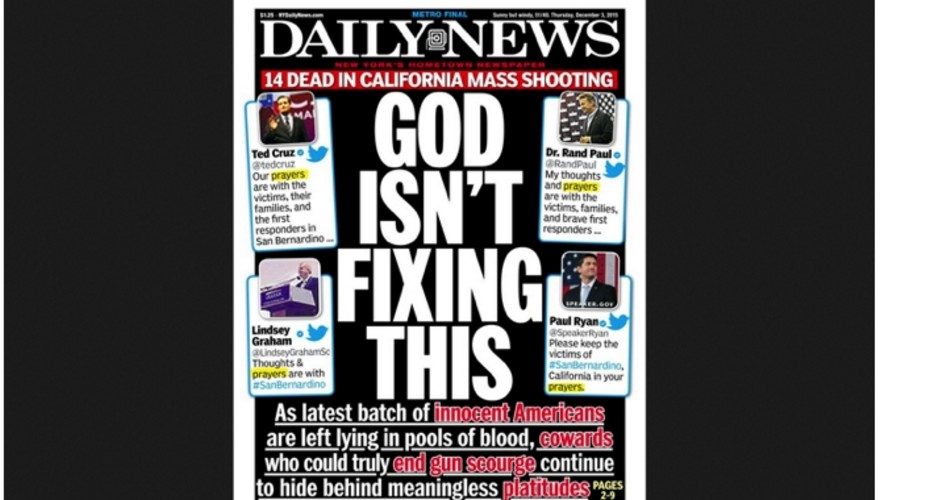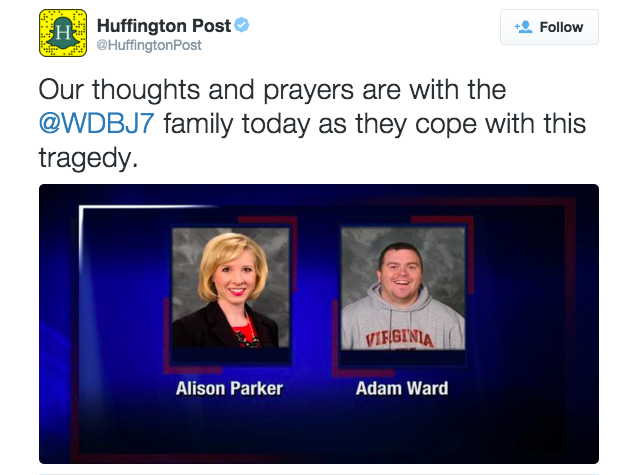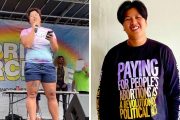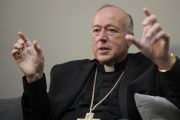
“GOD ISN’T FIXING THIS,” shouted the December 3 New York Daily News cover. Then there was the sneering , “Dear ‘thoughts and prayers’ people: Please shut up and slink away. You are the problem, and everyone knows it,” by Washington Post columnist Gene Weingarten. These sentiments, in case you didn’t know, were expressed right after the San Bernardino terrorist incident — almost before the blood was even dry.
The Left has long exhibited antipathy for religion, Christianity in particular. Yet the reaction after the San Bernardino shooting, committed by jihadists Syed Farook and his bride, Tashfeen Malik, is unprecedented. Leftist entities ranging from papers to pundits to politicians have gone where no liberal has gone before: mocking those who say their wishes and prayers are with deceased crime victims and their loved ones.
The mockery’s intended targets, we’re told, were pro-Second Amendment-rights Republicans expressing prayer sentiments, figures such as Donald Trump, Ted Cruz, Ben Carson, and RNC chairman Reince Priebus. As activist Shaun King tweeted, “Prayers don’t stop bullets.” The problem? This gun-control effort is much like dropping a neutron bomb on your own troops to eliminate one supposed spy in their midst. Countless millions of people from the United States and beyond, from across the political spectrum, send prayers after tragedies. These leftists have become the Grinch who tried to steal not just Christmas, but faith itself.
Even the Washington Post had to admit it was a bridge too far. In a column entitled “The hypocrisy of ‘prayer shaming’ after San Bernardino,” its Callum Borchers wrote, “The implication is clear…. We should abandon a long and noble tradition (praying) because it cannot completely insure against future danger. The hypocrisy is striking — and not only because some who are now ‘prayer shaming’ have in the past offered the same ‘thoughts and prayers’ themselves.” As an example, Borchers cites the Huffington Post as a prayer-shamer and then points to the following tweet, sent by the e-paper on August 26 about the on-camera murder of a news reporter and her cameraman:

Borchers also explains that the prayer-shaming secularists apparently misunderstand prayer’s purpose, writing, “God isn’t a wish-granting genie. People don’t pray because they expect God to make their lives — or the world — perfect. They make requests, sure, but they understand that God might have different plans. Mostly they pray for God to influence them, not the other way around.”
This brings us Borchers’ accusation of hypocrisy. He says that while the prayer-shamers say there’s no point in praying because there will still be violence in the future, they nonetheless advocate the continued acceptance of Mideast Muslim migrants even though it is for certain that some will commit jihadist violence in the future. As he also writes, “Now, heavenly prayer without Earthly action is just as illogical as welcoming refugees without thorough vetting,” which, “as even the White House has flatly acknowledged,” is impossible.
The prayer-shamers are also impugning what G.K. Chesterton called “the democracy of the dead”: tradition. As the Atlantic’s Emma Green pointed out, “Prayer and political action have a deeply entwined history in America. From civil rights to women’s suffrage, nearly every social-justice movement has had strong supporters from religious communities — U.S. history is littered with images like the one of pastors and rabbis marching on Selma, side by side with political activists.” Green then wrote:
There are many assumptions packed into these attacks on prayer: that all religious people, and specifically Christians, are gun supporters, and vice versa. That people who care about gun control can’t be religious, and if they are, they should keep quiet in the aftermath of yet another heart-wrenching act of violence. At one time in American history, liberals and conservatives shared a language of God, but that’s clearly no longer the case; any invocation of faith is taken as implicit advocacy of right-wing political beliefs.
The most powerful evidence against this backlash toward prayer comes not from the Twitterverse, but from San Bernardino. “Pray for us,” a woman texted her father from inside the Inland Regional Center, while she and her colleagues hid from the gunfire. Outside the building, evacuated workers bowed their heads and held hands. They prayed.
And what can be said about the Left’s preying on prayer? As Town Hall’s Matt Vespa opined, perhaps speaking for many, “When prayer has become a political punching bag, you know something is wrong … with the other side. Should we be shocked? Probably not — remember when the Democratic Party, which holds positions that align with most of these clowns’ political leanings, pretty much booed God during their 2012 convention.”
But perhaps the worst post-San Bernardino attack on faith isn’t on prayer but on a perhaps prayerful man. In what one pundit called an “unspeakable column,” Linda Stasi of the Daily News (again) drew parallels between San Bernardino shooter Farook and one of his victims, Messianic Jew Nicholas Thalasinos. Calling the murdered Thalasinos “just as bigoted” as the terrorist, she wrote:
They were two hate-filled, bigoted municipal employees interacting in one department. Now 13 innocent people are dead in unspeakable carnage.
One man spent his free time writing frightening, NRA-loving, hate-filled screeds on Facebook about the other’s religion.
The other man quietly stewed and brewed his bigotry, collecting the kind of arsenal that the Facebook poster would have envied.
What they didn’t realize is that except for their different religions they were in many ways similar men….
The killer, however, became half of an Islamic Bonnie & Clyde, while the other died as the male equivalent of Pamela Geller.
In making her case against Thalasinos, Stasi’s most damning evidence is his support for columnist Ann Coulter and his statement that “Hashem” (God) should destroy Iran. The latter is pretty harsh, but it’s no worse than millions of social-media statements made by Americans every year. It’s no match for the comments of leftists who said that a cute six-year-old boy expressing anti-Obama sentiments in a 2012 video should be killed. Nor was it much different from the expressions of liberal supporters of cop-killer Christopher Dorner, one of whom, speaking for many, said Dorner was just “taking out the trash.”
One also could wonder if Stasi had the same feelings about Barack Obama’s 20-year friend, mentor, and pastor, Jeremiah Wright, who screamed from the pulpit “God **** America!”
Yet while Wright’s church isn’t the best example, the reality is that research increasingly demonstrates — contrary to the prayer-shamer’s thesis — religious belief’s benefit. Newsmax reported in March that an “exhaustive analysis of more than 1,500 reputable medical studies ‘indicates people who are more religious and pray more have better mental and physical health.’” In fact, one study showed that heart patients who were prayed for recovered more quickly than those who received no prayers, even when they didn’t know they were being prayed for.
Whatever one’s thoughts on the above, he could wonder about the spiritual health of people whose response to a bloody tragedy is to prey on prayer — and of a nation that elevates them to positions of influence.


